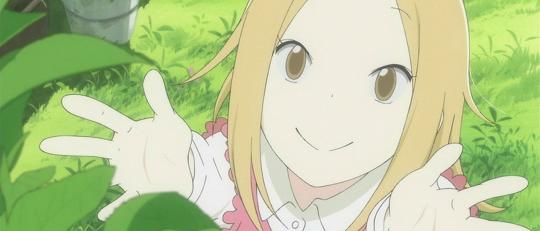Usagi Drop proves that good characters and a solid story never go out of fashion. It divorces itself from so many anime tropes - big eyes, sparkles, eyecatches - that it seems hard to understand why it was animated in the first place. With both the time-spanning manga and feature film recently released, like Kimi ni Todoke, you can now pick your particular brand of drama. But as the curtain closes on the final episode, it's obvious that without the watercolour palette, Rin's sparrow smile and the abstract perfection of animation, the series could only be half as charming and half as endearing.
The story cheats somewhat by placing Rin as a cogent six year-old rather than a bratty teenager or howling babe, either end of that spectrum and moments such as losing one's first teeth, or going to school for the first time are lost and replaced by times far less adorable. Similarly Rin's demeanour as a mature proto-maid and Daikichi's chronic sensibility smooths over a lot of the abrasiveness that adopting a growing child would entail. Like all good stories though, it is brevity that keeps the story tight. Eleven episodes means omissions and dangling threads are many, but crucially these do nothing to alter the warmth at the heart of the series.
Secondary characters like Rin's biological mother are shown just enough to add flavour but expected events like her and Rin's grand reconciliation or blazing argument never come, and instead things are left ambiguous and, dare it be said, realistic. Dramatic certainly, but events are always imperfect, tinged with a kind of idiocy only managed by people rather than merely characters. Whether that's Daikichi bopping Rin's head on the ceiling as he picks her up or Kouki's infuriating tomfoolery.
At its core the series is a picture book. With rose-tinted memories it cleaves away the cruft of modern existence - job, school, money, television - for the happier moments. Too easily could it have been unbearably saccharine and lapse into "aww kids do the darnedest things" but subtlety wins out. Daikichi only sporadically muses on how he's changed since becoming Rin's guardian and developments such as giving up smoking are completely forgotten for his burgeoning romance with a fellow single parent. Character development is applied gently, never feeling false or forced - Daikichi's journey from stoic loner to doting parent it only apparent upon comparison.
Really though it's just endlessly satisfying to have a story that doesn't stupefy, that deals in characters rather than archetypes, and doesn't so much end as finish. At times this kind of unexpected faith in the viewer is alarming: he's going to forget her birthday surely? Oh she'll break a twig and Rin will know she's there right? It's far from challenging, the expectation that Yukari and Daikichi will eventually be romantically involved seems a foregone conclusion; it's the quiddities of the characters that make the series so pleasing.
Never does Usagi Drop become life-affirmingly preachy or cloying drivel and settles instead for occasionally adorable, sometimes thought-provoking, othertimes heartwarming, but crucially, always engaging. This isn't the anti-anime its lack of identifiable stereotypes hints at but a drama that knows its strengths and sticks to them rather than needlessly toying with its medium.

As for the art-style, a tricky question. Out of everyone it's Daikichi who has the most "generic" of visual styles although I'm assuming that's purposeful to give him the everyman vibe. Changing the art-style though would definitely change the innate feeling of the series but I'd like to believe the characters and story would still be as strong. If you started introducing the idiosyncrasies of "moe" shows (is it still called "moeblob"?) however - rather than just the aesthetics - then things begin to be a little muddier.
I guess the best comparison I can think of is between Aria and Mushishi. The former closer to more mainstream styles (as I understand from you) and the latter closer to Usagi Drop but both sterling shows with similar tone.
In short: for me story and characters will always trump aesthetic style, but getting the right tone for visuals is important.